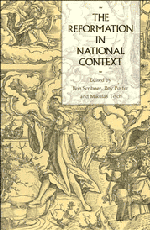12 - Spain
Published online by Cambridge University Press: 04 December 2009
Summary
Martin Luther's early career in Germany excited the interest of Spain's intellectual elite. At the Diet of Worms ‘everybody, especially the Spaniards, went to see him’, confessed one of the Emperor's Spanish entourage, ‘but I could never get a step near him’. The same witness testified of the Spaniards that ‘at the beginning, when Luther touched only on the need to reform the Church and on the corruption of morals, everybody agreed with him, and even those who now write against him confess in their books that at the beginning they were in favour of him. There was nothing more common then than to hear them saying “Luther is right in what he says”’. There were two areas of common interest: the relevant Spaniards - a select group close to Charles V - were dedicated humanists and adepts of the philosophia Christi; they were also, like Luther, sharply critical of the abuses of the papacy. All without exception agreed with the Emperor in rejecting the political implications of Luther's stance, but when they returned with Charles to the peninsula in mid-July 1522 their ideological position was a bit more equivocal.
Spain in 1522 was afroth with ideas. A native tradition of spirituality produced numerous manuals, best represented by the writings of Garcia de Cisneros, reforming abbot of the monastery of Montserrat, and by those of the Franciscan Francisco de Osuna; but there was also an influential current of spiritual writings brought in from Italy (Cardinal Cisneros, the abbot's brother, promoted and translated the works of Savonarola) and from the Netherlands.
- Type
- Chapter
- Information
- The Reformation in National Context , pp. 202 - 214Publisher: Cambridge University PressPrint publication year: 1994
- 1
- Cited by

